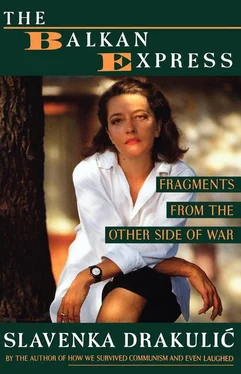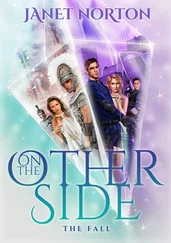— You also helped to load the corpses on to the truck?
— No, I couldn’t do it, I just stood by. I couldn’t really take it. As soon as I got there, I began to vomit. People, dead people, rotting, decaying, flies coming out of their mouths. I just collected weapons.
— Do you know who those dead people were?
— Their men. All older guys, reservists and volunteers with beards. Only two of them were from Borovo, that’s a town nearby, they joined the Chetniks. We took their IDs from their pockets and piled them all together in a big heap; they were all from Serbia, from Pazova, Nis, mostly from Sid. We drove the truck to the bank of the River Danube, there was this large hole and we buried them in it. But after one truck-load the hole was full. There was no place to bury them any more, so we made a pile of bodies near the water tower and burned them. The money we burned, too, nobody was allowed to touch their money. The commander’s orders. We just kept the IDs.
— Did you get used to the whole thing?
— I did, you turn into a machine. You simply work like a machine. You think like a man and act like a robot. You’ve got to. Because if you have any feelings left… there… in the war…
— How do you know you’ve turned into a machine?
— You just know it, you think in a different way. See, we caught one of theirs, from Sid. He was a reservist, thirty years old, but very extreme, you could tell straight away. He had a membership card of the Chetniks’ party and a photo of Seselj, the Chetnik leader. We gave him some hope, we told him it’s going to be all right, we’d trade him for one of our own although the chances for trading prisoners were slim, they killed our guys on the spot. But one of our fighters was missing. We called their barracks, we thought that maybe we could work out an exchange of prisoners. The whole conversation took place in front of this Chetnik, he could hear everything. From the barracks they said: those men of ours that you’ve captured don’t deserve to live if they’ve allowed themselves to fall into the hands of the Ustashas. When we capture yours, you know what we do to them. And they hung up? And this reservist, he started to laugh, he was proud of it…
— Proud? Of what?
— Of what this man in the barracks said, that we know what they do to our guys. Like he was nuts, like he didn’t cotton on to the fact that he was our prisoner. The guys jumped on him, started to hit him. All those days while we held him prisoner he kept cursing us and our Ustasha mothers. We gave him food, nobody beat him, nothing. You came up to him and he spat at you. Then, of course, one of our guys flipped out, came to the commander and said, you take me to court, but I’m going to kill this man. The commander forbade it, but… we went down to the basement, this guy untied him. The Danube river was two hundred yards from us. He made him go into the water and then he killed him.
— Although the commander forbade it?
— But, you see, the war had already started. In war you listen to your commander but the commander allows you to do what you think is best for you. Because he gives orders, but it’s you who’s going to get killed.
— Have you seen many things like that happening?
— I never saw our guys butcher anybody or use a knife on a reservist. I did see something else… a man being beaten to death.
— A reservist?
— No, he was a local Serb who turned Chetnik, he was twenty-five. It was a hundred per cent certain that he had murdered some of our people. He himself admitted to two of our fighters that he’d killed their parents – the father and mother of one and the father of the other. He told them that openly because they used to be friends before.
— Did he tell them why he did it?
— He just said, you’re Ustashas, this is Serbia. One Serb escaped from their barracks and confirmed all that had been said about his slaughtering people. When we caught him, the boys whose parents he had murdered came, two brothers, one twenty-eight and the other twenty-three. This man butchered both their father and mother. And the third guy, he’s twenty-three and his brother was killed. One day this man cut the throat of his father, and on the next day his brother was killed in the battle… And he says, Is it true what they’re saying, that you killed my father? And the man says, Yeah, it’s true, I killed your father. And this guy says, Why? The man says, Because you’re Ustasha. And this guy says, And earlier, when we were pals, was I a Ustasha then? No, he says, but you went over to them. Our guys got really mad like and jumped on him. They beat him like hell, it’s hard to describe. They beat him and they cried, because he used to be their friend.
— And you saw this?
— We all stood there and watched, fifty of us.
— Fifty of you just stood there and watched as the three of them beat him up?
— They beat him up one by one. Later the others went mad, too. This used to be a tight group of friends, those four guys and a couple of others. They were friends until July, and then this Serb went away and when he came back, he was a Chetnik. They had been together since they were sixteen. And when they heard he was caught after he had killed their parents…
— What did they beat him with? Did they kick him with their feet?
— They beat him with everything, sticks, everything… And I couldn’t condemn them for what they did. If someone told me he had murdered my parents, I’d kill him right away. I didn’t feel sorry for him, not a bit, though I knew him, too. I had no feelings towards him, but I didn’t want to beat him. I just stood there, didn’t get involved, because they were beating him. And suddenly this other guy grabbed him by the chin and twisted his head. He just grabbed him and wrenched, like this… They beat him until he died. Then they threw him into the Danube.
— Did any of your commanders know about that?
— They did…
— But they couldn’t do anything?
— There’s not much anyone can do. When someone tells you he has murdered your Mum and Dad. Even if the highest-ranking commanding officer came and told you you mustn’t kill this man, it wouldn’t work. It’s revenge.
— And this was the worst thing that happened?
— The worst was when I killed a man for the first time.
— You mean, from close up?
— Yes. There were three of us, my brother, myself and a friend of ours. We went out to meet them. We hid in a house some fifty yards from their barracks and we saw them coming, three of them, carrying backpacks.
— What were they?
— Reservists.
— How can you tell who are reservists?
— You can tell them right away, they have beards, they’re shabby, they stink of liquor, they really stink, that’s no lie. They went around robbing people’s houses. We let them approach to about five yards away, they were coming towards us but didn’t see us.
— To five yards precisely?
— Yes, but they couldn’t see us because the sun was in their eyes and we were in the basement. When they came close, this friend of mine, who was on the ground floor, came out of the house and told them to drop their weapons. We wanted to take them prisoner. Then they pointed their machine-guns at us and we just blew them away. We came up to them to take their weapons, we took their backpacks, too, because we thought they might be carrying bombs, but we saw it was phones so we left them there.
— Phones?
— Phones! And all sorts of things, they’d even steal clothes. I couldn’t sleep all night. I had done it before… from afar. I saw the man fall when I shot him. But the feeling’s not the same, not even remotely. You’re standing right before him, he begins to lift his gun and you just… It’s like a machine, there’s no feeling to it, no thinking. Either he’s going to get you or you’re going to get him. And then what was really terrible, I took the gun from the man I had killed and I saw that it wasn’t even loaded! He did aim at me but he couldn’t really shoot: the gun wasn’t cocked and wasn’t loaded. He raised his gun mechanically while he knew all the time he couldn’t shoot. I was younger, he thought I would get scared and throw down my gun. But when I saw him aim at me, I just shot him, just like that and… it was over.
Читать дальше












